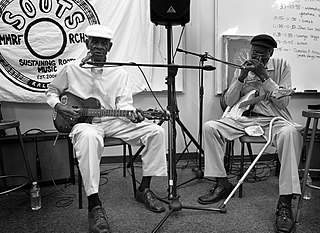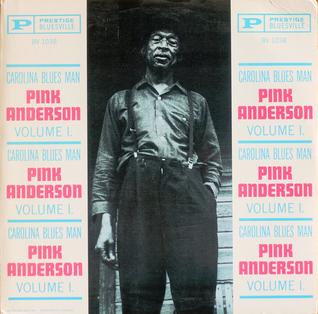Related Research Articles

Arthel Lane "Doc" Watson was an American guitarist, songwriter, and singer of bluegrass, folk, country, blues, and gospel music. Watson won seven Grammy awards as well as a Grammy Lifetime Achievement Award. Watson's fingerstyle and flatpicking skills, as well as his knowledge of traditional American music, were highly regarded. Blind from a young age, he performed with his son, guitarist Merle Watson, for over 15 years until Merle's death in 1985 in an accident on the family farm.

Pinkney "Pink" Anderson was an American blues singer and guitarist.

Floyd Council was an American blues guitarist, mandolin player, and singer. He was a practitioner of the Piedmont blues, which was popular in the southeastern United States in the 1920s and 1930s. He was sometimes credited as Dipper Boy Council and promoted as "The Devil's Daddy-in-Law".

David "Honeyboy" Edwards was a Delta blues guitarist and singer from Mississippi.

Etta Baker was an American Piedmont blues guitarist and singer from North Carolina.

Lonnie Brooks was an American blues singer and guitarist. The musicologist Robert Palmer, writing in Rolling Stone, stated, "His music is witty, soulful and ferociously energetic, brimming with novel harmonic turnarounds, committed vocals and simply astonishing guitar work." Jon Pareles, a music critic for the New York Times, wrote, "He sings in a rowdy baritone, sliding and rasping in songs that celebrate lust, fulfilled and unfulfilled; his guitar solos are pointed and unhurried, with a tone that slices cleanly across the beat. Wearing a cowboy hat, he looks like the embodiment of a good-time bluesman." Howard Reich, a music critic for the Chicago Tribune, wrote, "...the music that thundered from Brooks' instrument and voice...shook the room. His sound was so huge and delivery so ferocious as to make everything alongside him seem a little smaller."

Roy Book Binder is an American blues guitarist, singer-songwriter and storyteller. A student and friend of the Rev. Gary Davis, he is equally at home with blues and ragtime. He is known to shift from open tunings to slide arrangements to original compositions, with both traditional and self-styled licks. His storytelling is another characteristic that makes his style unique.

James Crutchfield was a St. Louis barrelhouse blues singer, piano player and songwriter whose career spanned seven decades. His repertoire consisted of original and classic blues and boogie-woogie and Depression-era popular songs.
Cootie Stark was an American Piedmont blues guitarist, singer, and songwriter. His best remembered recordings were "Metal Bottoms" and "Sandyland." Stark was known as the 'King of the Piedmont blues.'
Bishop Dready Manning is an American guitarist, harmonica player, singer, and songwriter who plays gospel music infused with Piedmont blues elements. He is also the founder of St. Mark Holiness Church in Roanoke Rapids, North Carolina, and a North Carolina Arts Council Folk Heritage Award winner.

George Higgs was an American Piedmont blues acoustic guitarist, harmonicist, singer and songwriter. He recorded three albums in his lifetime, although he spent over sixty years performing regularly, mainly in his home State. In 1993, Higgs was granted the North Carolina Heritage Award from the North Carolina Arts Council.

Valerie Turner is an American blues guitarist, vocalist, educator, and author. She plays in the Piedmont style of fingerpicking guitar, continuing in the traditions of Mississippi John Hurt, Elizabeth Cotten, Memphis Minnie, and Etta Baker. She performs blues, ballads, country, popular songs, ragtime, and gospels. She is a native New Yorker with southern roots in Virginia and Georgia. She started learning and studying traditional country blues guitar in 1978. Valerie and her spouse, Benedict Turner, are an acoustic blues duo called Piedmont Blūz. They specialize in Piedmont blues music, but also perform music from the Delta blues tradition. Benedict and Valerie are ambassadors of historic blues music, and educate their audiences about this early tradition and its artists.

Carolina Blues Man, subtitled Pink Anderson Volume I, is an album by blues musician Pink Anderson recorded in 1961 and released on the Bluesville label.

Dominique Flemons is an American old-time music, Piedmont blues, and neotraditional country multi-instrumentalist, singer, and songwriter. He is a proficient player of the banjo, fife, guitar, harmonica, percussion, quills, and rhythm bones. He is known as "The American Songster" as his repertoire of music spans nearly a century of American folklore, ballads, and tunes. He has performed with Mike Seeger, Joe Thompson, Martin Simpson, Boo Hanks, Taj Mahal, Old Crow Medicine Show, Guy Davis, and The Reverend Peyton's Big Damn Band.
James Arthur "Boo" Hanks was an American Piedmont blues guitarist and singer. He was billed as the last of the Piedmont blues musicians.
Jontavious Willis is an American country blues singer, guitarist, songwriter, and multi-instrumentalist. Willis has released two albums to date, with his sophomore effort, Spectacular Class, debuting at number 12 in the Billboard Blues Albums Chart in May 2019.
References
- ↑ "Little Pink Anderson". Musicmaker.org. Retrieved November 16, 2016.
- ↑ "Little Pink Anderson". Bluesweb.com. Retrieved November 16, 2016.
- 1 2 3 Leggett, Steven. "Little Pink Anderson - Biography". AllMusic . Retrieved November 16, 2016.
- ↑ Benicewixz, Larry. "Little Pink Anderson: In His Father's Footsteps". Bluesartstudio.at. Retrieved November 16, 2016.
- ↑ "Carolina Bluesman - Pink Anderson | Credits". AllMusic . Retrieved March 4, 2020.
- ↑ "Sittin' Here Singing the Blues - Little Pink Anderson | Releases". AllMusic . Retrieved March 4, 2020.